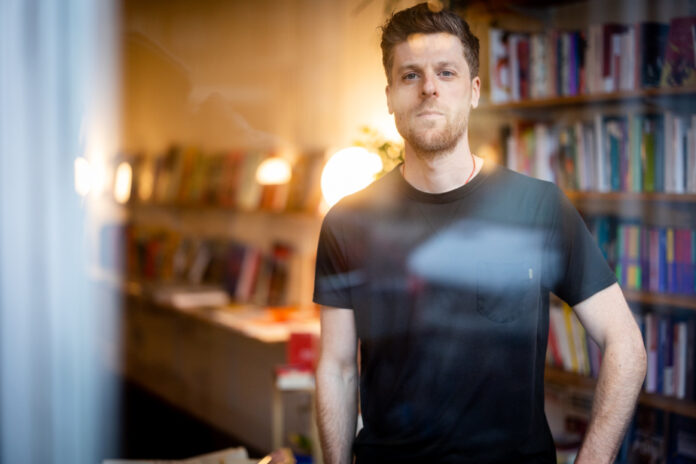“I’ve always been allergic to this desire to say even when you have nothing to say,” explains Jonathan Harnois. We flood the public space with all sorts of things that are not always necessary. Eighteen years after his memorable first novel, I would like to lay my head down, the writer finally reconnects with literature in You remind me of a breath, his correspondence with Robert Lalonde.
Jonathan Harnois remembers having experienced the astonishing success of I would like to put my head down (Éditions Sémaphore) as “a beautiful discharge of validation and love, as one seeks at that age”. In 2005, the writer was barely 24 years old and still nursing a hollow wound, that of the suicide of a lifelong friend, the raw material for this first book-buoy. In 2007, Claude Poissant transposed it to the theatre.
In the small firmament of Quebec literature, the star of Jonathan Harnois shone brightly. Very strong. Then, for 18 years, nothing. Or at least, no project as mediatised as a book, specifies in an interview the one who signed or co-signed a hundred songs (with Alex Nevsky, Dumas and Marie-Eve Roy, in particular), piloted the creation of the albums Le Saint- Laurent chanté and Nos forêt chantées, launched by Les Cowboys Fringants, and who co-wrote the play I am a leafless tree with street vendors from L’Itinéraire.
“Yes, the path is full of holes and my ego is full of bruises,” he confides to Robert Lalonde in Tu me reminds of a breath, the fruit of a correspondence over four seasons, born when Harnois was looking for someone to talk to about the erosion of our ability to listen to others. So, ego? “It has to do with all the ideas of success that we fill our heads with and, above all, that the world fills our heads with. It is this ego that is built through what is called success. »
“And that’s what makes you end up identifying with things that are just validation of the gaze of others, with the backlash that when it stops, you absolutely want to reproduce that experience. »
Despite this powerful desire to be applauded again, Jonathan Harnois will have had the instinct not to rush the sequel and not to publish a second novel just because the success of the first called for another quickly.
Jonathan Harnois lived for a long time in his Westfalia, then in Shefford, in a magnificently decrepit house, far from the distractions of the city. He now supports himself – financially and quietly – as a fumigator on cargo ships, a job that quenches his thirst for adventure and encounters, while offering him many writing spots, in his cabin, in the middle of the St. Lawrence.
At 41, the writer continues to place the word freedom at the top of the list of his “legitimate thirsts”, to use the beautiful phrase he uses in You remind me of a breath. Met at the Correspondances d’Eastman in 2007, Robert Lalonde will have been for him a precious guide on the sometimes bumpy paths of this life that he invents for himself on the sidelines of the marked paths of traditional success.
Crossed by doubt, the exchanges between the veteran and his younger brother end up drawing the portrait of a rebirth, that of an author who battles with his anxieties and who seeks to understand if he is writing for the right reasons.
“My literary fire can no longer always tell the difference between what stifles it and what feeds it,” Jonathan confesses to his friend Robert. I can’t always tell powder in the eyes from gunpowder. I no longer know if, in writing, I am the fire, the arsonist or the seriously burned person. »
“My relationship to creation is linked to my teenage revolt,” he says in an interview. We revolt because we want to keep alive our relationship to the sublime, to the absolute, while everywhere around, it is the mediocre world that seems to be waiting for us. »
If he has never given up his revolt, Jonathan Harnois is working to ensure that his fire no longer turns into an inferno. I’d Like to Lay My Head Down allowed her to experience “the full therapeutic and cathartic potential of writing.” “This is the book that, in my grieving process, has accompanied me to others. »
But writing cannot save our skin every day. It would be asking too much of him. “That’s why it took me years to reframe my relationship to creation, even though I still think that writing should remain a vertiginous mirror, something like a gentle precipice. »















